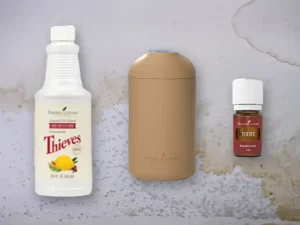Loss of smell, or anosmia, has been a challenge many of us—or someone we know—have faced in recent years. Whether due to illness, allergies, or post-viral complications like those following COVID-19, loss of smell can significantly affect your quality of life. Thankfully, recent research and natural practices such as smell training also known as olfactory training offer hope for recovery from loss of smell.
Understanding loss of smell
- Anosmia is the complete loss of smell.
- Parosmia is when your brain misinterprets odours, recognising them as something completely different.
Both conditions are frustrating but can improve over time with consistent effort, including smell training and natural remedies.
Smell Training: A Path to Recovery
Smell training leverages the brain’s neuroplasticity—the ability to reorganise and adapt after injury. Regularly exposing yourself to specific scents can help retrain your brain and olfactory system.
How to do Smell Training:
- Gather a Kit of Essential Oils or Familiar Scents:
Use a mix of citrus, floral, mints, conifers (tree oils), and spices. Examples include lemon, orange, rose or geranium, eucalyptus, clove, peppermint and cinnamon bark. - Smell the Scents Consistently:
Spend 1-2 minutes on each scent several times a day. Focus on identifying and recalling each fragrance while smelling it. - Duration:
Commit to the practice for at least three to six months. Patience is key, as recovery from loss of smell can be gradual.
Evidence Supporting Smell Training
A UK study demonstrated that consistent smell training can lead to significant improvements in olfactory function, especially for individuals recovering from post-viral smell loss. Participants used smell kits containing a variety of odours such as eucalyptus, lemon, rose, and cinnamon and engaged in regular, twice-daily training over several months. The study highlighted the role of neuroplasticity in helping the brain reorganise and recover its ability to perceive smells effectively. After six months, many participants showed clinically meaningful recovery, making smell training a promising, low-risk intervention for smell disorders.
The Quality of the Essential Oils Used Matters
The quality of essential oils significantly impacts their effectiveness, safety, and therapeutic benefits, particularly when used for health-related purposes like smell training or alleviating nasal issues. Here’s why quality matters:
1. Purity and Potency
- High-quality oils are typically pure, containing only the plant essence without synthetic additives or fillers. This purity ensures their therapeutic properties remain intact.
- Low-quality or adulterated oils may contain harmful chemicals that could irritate the skin, nose, or respiratory system, reducing their effectiveness for olfactory recovery or smell training.
2. Safety
- Impurities in low-quality oils can cause allergic reactions, respiratory irritation, or other side effects. High-quality oils are often subject to rigorous testing to ensure they are free from contaminants like pesticides, heavy metals, or solvents.
- Oils labeled as “food grade” or “therapeutic grade” are often safer for use in diffusers or diluted applications.
3. Effectiveness
- High-quality essential oils maintain the integrity of the plant’s active compounds, ensuring the oils provide their intended benefits. For example:
- High Quality Eucalyptus high cineole content which supports clear breathing.
Oils of inferior quality might not provide the benefits you are looking for because they lack the correct chemical composition.
4. Source and Production
- High-quality oils come from plants grown in optimal conditions, harvested at the right time, and distilled using proper techniques. For instance:
- Steam distillation for lavender ensures maximum retention of beneficial compounds.
- Cold-pressed citrus oils preserve delicate volatile compounds.
Low-quality oils may come from over-processed or poorly sourced materials, reducing their efficacy.
5. Testing and Certification
- Reputable brands undertake GC/MS (Gas Chromatography-Mass Spectrometry) testing, showing the chemical profile of the oil.
- Frequently, organisations like The Association French Normalization Organization Regulation (AFNOR) and International Standards Organization (ISO) are cited by companies to assert oil quality. However, AFNOR and ISO only differentiate between lower-grade fragrance oils and therapeutic-grade essential oils—they do not measure actual oil purity or potency.
How to Identify High-Quality Essential Oils
- Look for transparent labeling with Latin botanical names, plant part used, and country of origin.
- Avoid oils marketed as “fragrance oils” or “aromatherapy oils” without ingredient details.
- Purchase from reputable brands with a track record of providing lab-tested products. Who do I recommend?
By using high-quality essential oils, you maximise safety and effectiveness, ensuring the best results for your olfactory health and overall well-being.
Other Natural Remedies for Loss of Smell
Steam Inhalation
Inhaling steam infused with essential oils or herbs like peppermint, eucalyptus, or chamomile can help clear nasal congestion and stimulate olfactory nerves. Add a few drops of essential oil to a bowl of hot water and inhale deeply under a towel.
Diet and Supplements
Anti-inflammatory foods such as ginger, turmeric, and omega-3 fatty acids may support olfactory nerve health. Zinc and vitamin A are particularly beneficial for nasal health and regeneration
Nasal Irrigation
Using a saline solution to rinse the nasal cavity can clear mucus buildup and reduce inflammation. Neti pots or saline sprays are effective tools.
Gentle Cheek and Sinus Massage
Massaging your cheeks, particularly with oils like Brain Power essential oil.
Deep Breathing Exercises
“Sniff training” involves deep and intentional smelling practices, often referred to as “bunny sniffs” (short, quick sniffs). This technique helps activate olfactory receptors.
Address Underlying Causes
- For mucus buildup: Natural decongestants like peppermint or menthol help.
- For inflammation: Anti-inflammatory practices, including essential oils and a healthy diet, can be beneficial.
These natural remedies, combined with patience and consistency, can enhance your chances of regaining your sense of smell. Always consult a healthcare provider for persistent or severe cases to rule out underlying conditions.
Expert Recommendations
- Dr. Alexander Ramirez, medical director of the clinical program in otolaryngology at Intermountain Healthcare, recommends using essential oils such as eucalyptus, clove, lemon, and rose for smell therapy. This method involves smelling these scents, as they represent a broad range of olfactory stimuli, to help retrain the sense of smell. He also suggests “bunny sniffs” (three short sniffs in quick succession) to maximize effectiveness. Smell therapy is particularly valuable for those experiencing post-viral anosmia and has shown potential in aiding recovery through neuroplasticity over several months. Click here to read more.
- The Monell Center emphasises that regular exposure to familiar, non-irritating odours such as coffee grounds, perfumes, and flavour extracts can help improve smell function over time. This approach is part of olfactory retraining or “smell training,” which involves consistently and intentionally engaging the brain’s ability to adapt and recover sensory functions, a concept rooted in neuroplasticity. Repeated exposure to these scents can encourage the brain to reorganise itself to better recognise and process smells. For further insights into smell training to overcome loss of smell and other resources, you can explore more on the Monell Chemical Senses Center
Making Your Smell Kit
To start smell training, I have created a simple kit with the following:
- Citrus: Orange essential oil
- Floral: Geranium essential oil
- Spices: Clove essential oil
- Tree Oils: Eucalyptus Radiata essential oil
- Mint: Peppermint essential oil
Click here to purchase the Smell Training Kit.
Focus on scents you recognise and can recall to help re-familiarise your brain with these smells.
What’s Your Experience?
Have you tried smell training or natural remedies for loss of smell? Share your journey in the comments below to inspire and support others navigating this challenge.
By incorporating smell training and essential oils, you can take proactive steps toward regaining your sense of smell and enhancing your quality of life. Remember, consistency and patience are crucial. Start small and stick with it—you may be surprised by the results!










 Subscribe to Hot Oily Mumma
Subscribe to Hot Oily Mumma